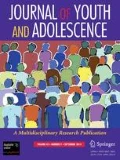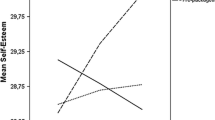Abstract
There is a lack of studies in the literature addressing the differential effectiveness of Social and Emotional Learning according to their implementation setting. This study compared the effectiveness of an upper middle school Social and Emotional Learning program applied in two different settings: within school and after-school hours, while controlling for individual and class-level variables. There were 837 students (Mage = 12.70; SD = 0.98; 47.6% were female): 246 in the control group, 319 in the after-school intervention group and 272 in the within school schedule intervention group, assessed at pretest, post-test and follow-up seven months later. Multilevel analyses identified more positive intervention results in on self-esteem, self-control, and social awareness for students in the within school schedule groups. Girls gained more in social awareness in both program settings. This study highlights the importance of analyzing Social and Emotional Learning program´s differential effectiveness in order to optimize it.
Similar content being viewed by others
References
Arsenio, W.F., Adams, E., & Gold, J. (2009). Social information processing, moral reasoning, and emotion attributions: Relations with adolescents’ reactive and proactive aggression. Child Development, 80, 1739–1755. https://doi.org/10.1111/j.1467-8624.2009.01365.x.
Belfield, C., Bowden, B., Klapp, A., Levin, H., Shand, R., & Zander, S. (2015). The economic value of social and emotional learning. New York, NY: Center for Benefit-Cost Studies in Education.
Caemmerer, J.M., & Keith, T.Z. (2015). Longitudinal, reciprocal effects of social skills and achievement from kindergarten to eighth grade. Journal of School Psychology, 53, 265–281. https://doi.org/10.1016/j.jsp.2015.05.001.
Castillo, R., Fernández-Berrocal, P., & Brackett, M.A. (2013). Enhancing teacher effectiveness in Spain: A pilot study of The RULER approach to social and emotional learning. Journal of Education and Training Studies, 1, 263–272.
Coelho, V., & Figueira, A. (2011). Project “Positive Attitude”: promoting school success through social and emotional abilities development. Design for elementary and middle school students, in Portugal. Interamerican Journal of Psychology, 45(2), 185–192.
Coelho, V., Marchante, M., & Sousa, V. (2015). “Positive Attitude”: A multilevel model analysis of the effectiveness of a social and emotional learning program for Portuguese middle school students. Journal of Adolescence, 43, 29–38. https://doi.org/10.1016/j.adolescence.2015.05.009.
Coelho, V., Marchante, M., Sousa, V., & Romão, A.M. (2016). Programas de intervenção para o desenvolvimento de competências socioemocionais: Uma revisão crítica dos enquadramentos SEL e SEAL [Social and emotional learning programs: A critical review of SEL and SEAL frameworks]. Análise Psicológica, 34, 61–72. https://doi.org/10.14417/ap.966.
Coelho, V., & Sousa, V. (2017a). Comparing two low middle school social and emotional learning program formats: A multilevel effectiveness study. Journal of Youth and Adolescence, 46, 656–667. https://doi.org/10.1007/s10964-016-0472-8.
Coelho, V.A., & Sousa, V. (2017b). The impact of class-level variables on the effectiveness of a middle school social and emotional learning program: A multilevel analysis. Journal of Relationships Research, 8, e21 https://doi.org/10.1017/jrr.2017.21.
Coelho, V., Sousa, V., & Marchante, M. (2015). Development and validation of the social and emotional competencies evaluation questionnaire. Journal of Developmental and Educational Psychology, 5(1), 139–147. https://doi.org/10.5539/jedp.v5n1p139.
Coelho, V., Sousa, V., & Figueira, A.P. (2016). Positive attitude program’s impact upon self-concept across childhood and adolescence. Revista de Psicodidactica, 21(2), 261–280. https://doi.org/10.1387/RevPsicodidact.15129.
Collaborative for Academic, Social, and Emotional Learning. (2015). 2015 CASEL guide: Effective social and emotional learning programs (Middle and high school edition). Chicago, IL: Author.
Conduct Problems Prevention Research Group. (2010). The effects of a multiyear universal social–emotional learning program: The role of student and school characteristics. Journal of Consulting and Clinical Psychology, 78(2), 156–168. https://doi.org/10.1037/a0018607.
Cook, C.R., Williams, K.R., Guerra, N.G., Kim, T.E., & Sadek, S. (2010). Predictors of bullying and victimization in childhood and adolescence: A meta-analytic investigation. School Psychology Quarterly, 25(2), 65–83. https://doi.org/10.1037/a0020149.
Domitrovich, C.E., Durlak, J.A., Staley, K.C., & Weissberg, R.P. (2017). Social-emotional competence: An essential factor for promoting positive adjustment and reducing risk in school children. Child Development, 88, 408–16. https://doi.org/10.1111/cdev.12739.
Durlak, J., Weissberg, R., Dymnicki, A., Taylor, R., & Schellinger, K. (2011). The impact of enhancing students’ social and emotional learning: A meta-analysis of school-based universal interventions. Child Development, 82, 405–432. https://doi.org/10.1111/j.1467-8624.2010.01564.x.
Durlak, J.A., Weissberg, R.P., & Pachan, M. (2010). A meta-analysis of after-school programs that seek to promote personal and social skills in children and adolescents. American Journal of Community Psychology, 45, 294–309. https://doi.org/10.1007/s10464-010-9300-6.
Fontaine, A.M. (1991). Desenvolvimento do conceito de si próprio e realização escolar na adolescência. Psychologica, 5, 13–31.
Greenberg, M.T., Domitrovich, C.E., Weissberg, R.P., & Durlak, J.A. (2017). Social and emotional learning as a public health approach to education. Future of Children, 27, 13–32. http://www.jstor.org/stable/44219019 Retrieved from.
Greenberg, M., Weissberg, R., O’Brien, M., Zins, J., Fredericks, L., & Resnik, H., et al. (2003). Enhancing school-based prevention and youth development through coordinated social, emotional, and academic learning. American Psychologist, 58, 466–474. https://doi.org/10.1037/0003-066X.58.6-7.466.
Heck, R.H., Thomas, S.L., & Tabata, L.N. (2013). Multilevel and longitudinal modeling with IBM SPSS. 2nd edn. London: Routledge.
Holsen, I., Smith, B.H., & Frey, K.S. (2008). Outcomes of the social competence program Second Step in Norwegian elementary schools. School Psychology International, 29, 71–88. https://doi.org/10.1177/0143034307088504.
Hurd, N., & Deutsch, N. (2017). SEL-focused after-school programs. Future of Children, 27, 95–116. http://www.jstor.org/stable/44219023 Retrieved from.
Jones, S.M., Barnes, S.P., Bailey, R., & Doolittle, E.J. (2017). Promoting social and emotional competencies in elementary school. Future of Children, 27, 49–72. http://www.jstor.org/stable/44219021 Retrieved from.
Kataoka, S., & Vandell, D.L. (2013). Quality of afterschool activities and relative change in adolescent functioning over two years. Applied Developmental Science, 17, 123–34. https://doi.org/10.1080/10888691.2013.804375.
Malti, T., Ribeaud, D., & Eisner, M.P. (2011). The effectiveness of two universal preventive interventions in reducing children’s externalizing behavior: a cluster randomized controlled trial. Journal of Clinical Children and Adolescent Psychology, 40, 677–92. https://doi.org/10.1080/15374416.2011.597084.
Marsh, H.W., & Ayotte, V. (2003). Do multiple dimensions of self-concept become more differentiated with age? The differential distinctiveness hypothesis. Journal of Educational Psychology, 95(4), 687–706. https://doi.org/10.1037/0022-0663.95.4.687.
Marsh, H.W., Relich, J.D., & Smith, I.D. (1983). Self-concept: the construct validity of interpretations based upon SDQ. Journal of Personality and Social Psychology, 45, 173–187. https://doi.org/10.1037/0022-3514.45.1.173.
McClelland, M.M., Tominey, S.L., Schmitt, S.A., & Duncan, R. (2017). SEL interventions in early childhood. The Future of Children, 27(1), 33–47. Retrieved from http://www.jstor.org/stable/44219020
McKown, C. (2017). Social-emotional assessment, performance, and standards. Future of Children, 27, 157–178. http://www.jstor.org/stable/44219026 Retrieved from.
Sandler, I., Wolchik, S.A., Cruden, G., Mahrer, N.E., Ahn, S., Brincks, A., & Brown, C.H. (2014). Overview of meta-analyses of the prevention of mental health, substance use and conduct problems. Annual Review of Clinical Psychology, 10, 243–273. https://doi.org/10.1146/annurev-clinpsy-050212-185524.
Sklad, M., Diekstra, R., DeRitter, M., Ben, J., & Gravesteijn, C. (2012). Effectiveness of school-based universal social, emotional, and behavioral programs: Do they enhance students’ development in the area of skill, behavior and adjustment? Psychology in the Schools, 49, 892–909. https://doi.org/10.1002/pits.21641.
Taylor, R.D., Oberle, E., Durlak, J.A., & Weissberg, R.P. (2017). Promoting positive youth development through school-based social and emotional learning interventions: A meta-analysis of follow-up Effects. Child Development, 88, 1156–1171. https://doi.org/10.1111/cdev.12864.
VanSchoiack-Edstrom, L., Frey, K.S., & Beland, K. (2002). Changing adolescents’ attitudes about relational and physical aggression: An early evaluation of a school-based intervention. School Psychology Review, 31, 201–217.
Weissberg, R.P., Durlak, J.A., Domitrovich, C.E., & Gullotta, T.P. (2015). Social and emotional learning: Past, present, and future. In J.A. Durlak, C.E. Domitrovich, R.P. Weissberg & T.P. Gullotta (Eds.), Handbook of social and emotional learning: Research and practice (pp. 3–19). New York, NY: Guilford.
Wigelsworth, M., Humphrey, N., Kalambouka, A., & Lendrum, A. (2010). A review of key issues in the measurement of children’s social and emotional skills. Educational Psychology in Practice, 26(2), 173–186. https://doi.org/10.1080/02667361003768526.
Wigelsworth, M., Humphrey, N., & Lendrum., A. (2013). Evaluation of a school-wide preventive intervention for adolescents: The secondary Social and Emotional Aspects of Learning (SEAL) programme. School Mental Health, 5, 96–109. https://doi.org/10.1007/s12310-012-9085-x.
Wigelsworth, M., Lendrum, A., Oldfield, J., Scott, A., ten Bokkel, I., Tate, K., & Emery, C. (2016). The impact of trial stage, developer involvement and international transferability on universal social and emotional learning programme outcomes: a meta-analysis. Cambridge Journal of Education, 46, 347–376. https://doi.org/10.1080/0305764X.2016.1195791.
Wolpert, M., Humphrey, N., Deighton, J., Patalay, P., Fugard, A.J.B., Fonagy, P., Belsky, J., & Vostanis, P. (2015). An evaluation of the implementation and impact of England’s mandated school-based Mental Health Initiative in elementary schools. School Psychology Review, 44, 117–138. https://doi.org/10.17105/SPR44-1.117-138.
Acknowledgements
We would like to thank Richard Inman for his English revision; Ana Maria Romão, Marta Marchante, and Patrícia Brás for collecting and organizing the data. We would also like to thank the students who took part in this study.
Authors’ Contributions
V.A.C. conceived the study and its design, drafted the manuscript, and performed the statistical analysis; V.S. conceived the study, drafted the manuscript, and participated in the interpretation of the data. Both authors read and approved the final manuscript.
Funding
Project Positive Attitude is funded by Municipality of Torres Vedras.
Data Sharing and Declaration
The datasets generated and/or analyzed during the current study are not publicly available but are available from the corresponding author on reasonable request.
Author information
Authors and Affiliations
Corresponding author
Ethics declarations
Conflict of Interest
The authors declare that they have no conflict of interest.
Ethical Approval
The current study was approved by the Psychology for Positive Development Research Center. The present study was conducted following the national professional code of ethics for psychologists (OPP), following national legislation.
Informed Consent
All school directors agreed to the implementation of the programs and schools used passive informed parental consent, because the program could be considered part of the school offering.
Rights and permissions
About this article
Cite this article
Coelho, V.A., Sousa, V. Differential Effectiveness of a Middle School Social and Emotional Learning Program: Does Setting Matter?. J Youth Adolescence 47, 1978–1991 (2018). https://doi.org/10.1007/s10964-018-0897-3
Received:
Accepted:
Published:
Issue Date:
DOI: https://doi.org/10.1007/s10964-018-0897-3



